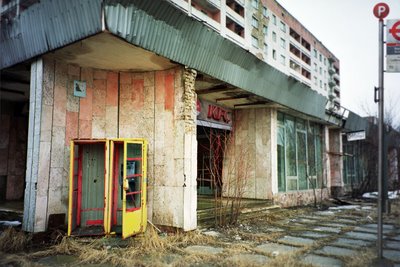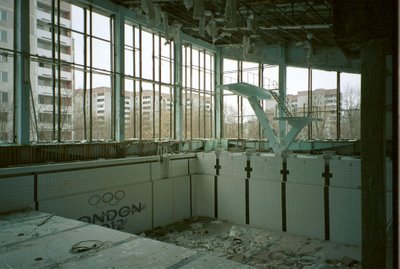The scenario that is the 'fictional' background and context for
At the dawn of the twenty-first century, most people in Britain
assumed that life would continue much as it had done for the previous
few decades. People would continue to get richer, live longer, and
buy fancier electronic gadgets. They would continue to drive cars,
work in offices, earn money, and buy their food in supermarkets.
Although this way of life was only a few decades old, it seemed as
timeless and permanent as the sun and the moon.
A few sceptical voices warned that this sense of permanence was an
illusion, that infinite economic growth on a finite planet was
impossible, that global warming and the looming energy crisis would
soon put an end to the consumer-friendly economy. But few people took
any notice. Academics discussed the possibility of economic collapse
in comfortably upholstered leather armchairs, and politicians
commissioned lengthy reports recommending policies that they had no
intention of implementing. And the vast mass of ordinary people went
on driving cars, working in offices, earning money, and buying their
food in supermarkets.
When the predictions of the sceptics came true, and the economy
started creaking, there was no announcement on the evening news, no
billboards proclaiming economic collapse. It was much more banal than
that. The first signs of impending doom were no more spectacular than
inflation and unemployment. It was the price of energy that began to
shoot up first. Electricity and gas got more and more expensive, and
an ever larger slice of the household budget went on cooking and
heating, leaving less for cable TV, fancy clothes and holidays abroad
– all of which came increasingly to be seen as luxuries. Petrol
doubled in price too, a hard blow to a nation that had become
accustomed to driving long distances to work and shopping in out of
town superstores. Since the food in those superstores was also
transported long distances, often by lorry, the rising price of fuel
also pushed up the price of food. Everyone began to feel a lot poorer.
The consequent drop in demand for consumer goods put a lot of shops
and companies out of business, and unemployment surged further. Soup
kitchens reappeared in most cities, and the number of homeless people
rose dramatically as more and more families found they couldn't pay
their mortgages any more and their houses were re-possessed.
The news from abroad was increasingly bleak too, as high fuel and
energy prices hit the poorer countries even harder than the wealthier
ones like Britain. Hardly a day passed without some new outbreak of
civil violence in Africa, the Middle East or Asia – riots in some
places, insurgency and guerrilla warfare in others. Vast numbers of
beleaguered civilians fled these troubles, and the throngs of migrants
were swelled by those who simply failed to find work at home. Some of
the migrants blamed the West for their problems, and were willing
recruits to the expanding ranks of terrorist groups, whose multiplying
plots overwhelmed the already overburdened security services. The
response, in Britain as elsewhere, was predictable; more
surveillance, further restrictions on civil liberties, and tighter
border controls.
The beefed-up security budget strained the public purse, which had
already been weakened by falling tax revenue as fewer people were in
work. Public services were slashed, and all sorts of infrastructure,
from roads to sewage plants, was no longer properly maintained. Then
the power cuts began. They started as an occasional annoyance, but it
wasn't long before the electricity companies were having to schedule
them so that people could at least plan for the current being switched
off, and turn on their emergency generators, sales of which boomed, as
did sales of solar panels and small wind turbines – at least, among
those who could still afford such things.
Those who couldn't just used candles, and sat around talking. All of
their previous evening activities had depended on electricity, so at
first people were at a loss to know how to entertain themselves
without it, but a few did eventually begin to rediscover the lost art
of conversation, or taught themselves how to play the acoustic guitar.
But the loss of light was in many cases accompanied by the loss of
heat, as houses with electric radiators were hit by a double whammy.
Those with gas central heating looked on smugly at first – until
disruptions in the supply of gas from Russia put them in the same
boat. People complained loudly to begin with, and then shut up and
put on thick sweaters. Whole families took to huddling together in
one bed at night just to keep warm, under piles of duvets and
blankets. Many older people succumbed to hyperthermia.
Cold showers were harder to adapt to, and many people preferred to
stay dirty for longer. They had to wash their clothes by hand too, as
washing machines were not very effective without hot water, and used
too much electricity anyway. People became much smellier, and head
lice began to spread rapidly. Duvets became infested with bedbugs,
and the health system began to creak under the weight of so many cases
of pneumonia. As rubbish collection became increasingly infrequent,
rotting food and other waste began to pile up at street corners, and
soon there were outbreaks of typhoid and cholera in London and Manchester.
And still most people failed to see that they were living through the
beginnings of a catastrophe. Every day on the radio an array of
experts could be heard claiming that a return to prosperity was just
around the corner, and suggesting policy initiatives that would turn
the economy around. More ominously, increasing air-time was given
over to the leaders of extremist movements, political and religious,
who took advantage of the growing fear and despair to promote their
gospels of hate.
Then came hurricane Gina. When it hit New York, on 30 September 2012,
it did much more than make a lot of people and companies homeless.
The insurance market was overwhelmed by the claims, and the resulting
financial panic spread from one stock market to another like a forest
fire. The dollar lost half its value in one day. The Chinese sold
their dollar reserves, causing the dollar to collapse still further.
All major currencies went into free fall. Inflation spiraled out of
control. Soon, money was hardly worth having at all.
Suddenly, most businesses were no longer viable. All the big
supermarkets virtually shut down overnight. Panic buying ensued, and
attempts by the government to impose rationing failed dismally.
Within a day, there was nothing left on the supermarket shelves.
Looters began raiding the remaining shops that still had food, and the
army was deployed in all the major cities. But the soldiers were
ill-prepared for keeping martial law in their own country, and the
trickle of desertions soon became a flood. Likewise, most police
officers preferred to stay at home to protect their own families than
face the angry mobs rampaging through the city streets.
Huge numbers of people began to flee the cities – mostly on foot, as
the scarcity of petrol made driving a rarity. Most of the refugees
did not get very far. Unaccustomed to sleeping outdoors or even
camping, the cold winter weather put paid to thousands. Those who
survived the frosty nights grew weaker to hunger and disease.
All that seems a long time ago now. Today, in the year 2025, things
have calmed down a lot. There are still some people living the
cities, but on the whole they aren't nice places to be. The only way
to make a reasonable living there now is by prostitution,
drug-dealing, or protection rackets. Those who aren't involved in
these lucrative trades struggle to make ends meet. They pull the
copper out of the walls and rip out sinks and pipework to swap for
food on street corners. They would love to move out to the country,
but they know it's too late for that now – those who already live
there don't look kindly on incomers. In fact, they have a nasty habit
of killing them.
Back in the first decade of the twenty-first century, before the
crash, some of few people who saw the writing on the wall got together
and started preparing for the challenging times ahead. They set up
self-sufficient communities in rural areas far enough away from the
major cities to avoid the first wave of refugees. They taught
themselves many old crafts that had been widespread before the
industrial revolution, but which had largely died out in the twentieth
century, such as weaving and smelting. They also learned to defend
themselves against attacks by hostile strangers. And they began to
store up cultural artifacts – books, music, works of art – to preserve
for posterity, like secular equivalents of the European monasteries
which preserved the great books of classical antiquity throughout the
Dark Ages, and so enabled future generations to enjoy these ancient
treasures.
One of those communities was called the utopia experiment. Nowadays,
those of us who live here, simply call it utopia. It's not quite as
ironic a name as it might first appear. For what we've discovered is
that, in many ways, things are better now than they were before the
crash – at least, it is for those of us who are lucky enough to live
out here in the countryside. The air is much cleaner for one thing,
and the wildlife has made a comeback. People have a lot more time to
spend with their children, and neighbours are always helping each
other out. And all that walking around and manual labor means that
people are a lot fitter than they used to be. You certainly don't see
any fat people any more. We like to think that the crash gave some
people a second chance, an opportunity to escape from the awful state
we'd got ourselves into in the late twentieth century.
www.utopiaexperiment.com


